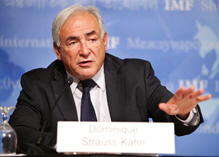
Typical street scene in Santa Ana, El Salvador. (Photo: iStock)
IMF Survey: Global Recovery Seems Stronger, But Still Fragile, Says IMF
January 14, 2010
- IMF Chief says recovery still depends on government stimulus in advanced economies
- Warns worst yet to come on unemployment numbers
- Announces $100 million to help earthquake-ravaged Haiti
The global economy is recovering significantly faster than previously expected, but growth is still dependent in most advanced economies on government stimulus measures and remains fragile, the Managing Director of the International Monetary Fund, Dominique Strauss-Kahn, said.

IMF Managing Director Dominique Strauss-Kahn stresses at a press conference that the global recovery remains fragile. (IMF photo)
IMF in 2010
While emerging market economies—especially in Asia—were leading the recovery, most advanced economies were still sluggish, with private demand weak and joblessness continuing to rise, he told reporters.
“We are not out of the woods until the private sector has recovered,” Strauss-Kahn said at a January 14 news conference in Washington that he started by conveying deep sympathies to the people of Haiti following the severe earthquake. The Managing Director announced the Fund would provide $100 million to Haiti very rapidly in emergency help and would coordinate with other agencies to come up with a larger assistance package in due course.
Multi-speed recovery
On the global economy, Strauss-Kahn said he expected to see countries around the world recovering at different speeds in the various regions. He urged governments not to relax stimulus measures too early in the mistaken belief that a strong recovery had taken hold, and suggested that they could shift stimulus measures toward projects that would create additional jobs.
The IMF is scheduled to release its update on the global outlook on January 26.
Breaking down what had happened during the past two years of crisis and looking ahead to 2010, he said this year must be a year of transformation, to complete the reshaping of the global financial and regulatory system.
• 2008 was a year of humility: “our confidence in markets, institutions, and the status quo turned out to be complacency; we learned how fallible, fragile, and interconnected we are.”
• 2009 was a year of unity: “the world pulled together to respond to a profound economic—and potentially human—calamity, and redeemed the promise of international cooperation.”
• 2010 must be a year of transformation—“we must complete the global project to address the failings in regulation, economic policy, and governance that lay behind the crisis.”
Regulation and financial sector supervision needed to be not just stronger but smarter. The aim was not to impose additional layers of regulation.
There was a risk, he said that momentum for reforming the financial sector could be lost and policymakers should not forget the roots of the crisis. He welcomed a proposal by U.S. President Barack Obama that major U.S. financial firms pay a fee to help the government recover losses from the financial crisis, saying this showed that the world’s biggest economy was prepared to follow up although the crisis was receding.
At the request of the Group of Twenty (G-20) industrialized and emerging market economies, the IMF is scheduled to provide an assessment by April of options for how governments can get the financial sector to contribute to the costs of the crisis. Strauss-Kahn said society must move away from a system where banks can “privatize gains but socialize losses.”
The IMF’s priorities
Strauss-Kahn outlined four priorities for the Fund in 2010, and also said the institution was looking into proposals for how to finance climate change measures. “We will provide ideas in the near future,” he said.
In the coming year, the IMF would focus on delivering the economic regeneration that will drive growth in this new decade. The four priorities comprised:
• A sustainable recovery of output and employment must be the highest priority. The Fund will provide the kind of real-time analysis needed to see this project through, guarding against too early—or too late—reversal of stimulus measures.
• The IMF will continue efforts to provide the kind of financing needed to tackle modern crises and try to improve its toolkit of financing packages to help member countries to keep recovery programs on track.
• The IMF will try to keep the spotlight on the need to modernize financial sector regulation and put in place mechanisms to identify and tackle the hidden risks to country economies. The upcoming reform of the Fund’s mandate is a historic opportunity to do the same at the global level, with more focus on systemic—not just country—level risks, especially in the financial sector, and financing facilities that provide the kind of insurance needed to avoid excessive and costly reserve accumulation.
• The IMF will continue to improve its governance structure, with the Managing Director saying that the Fund would meet an end-year deadline to deliver a fair redistribution of Fund quotas, and to pursue other governance reforms.
Adjustments in the Fund’s mandate were needed to take account of modern-day crises that were far broader than traditional balance of payments crises, and to broaden its scope to take into account the need to ensure that any financial instability does not spillover into social tensions and become a danger to world peace.
Asia Conference in Korea
The Managing Director, who is visiting Tokyo and Hong Kong January 19-21, also announced that Korea and the IMF are planning to jointly host a high-level international conference on Asia in Seoul during July 12-13, 2010.
The conference will bring together leading policymakers from Asia and around the world to examine the region’s economic dynamism and evolving role in international policymaking. It will also provide the IMF an important opportunity to deepen its engagement with Asia.
Comments on this article should be sent to imfsurvey@imf.org


